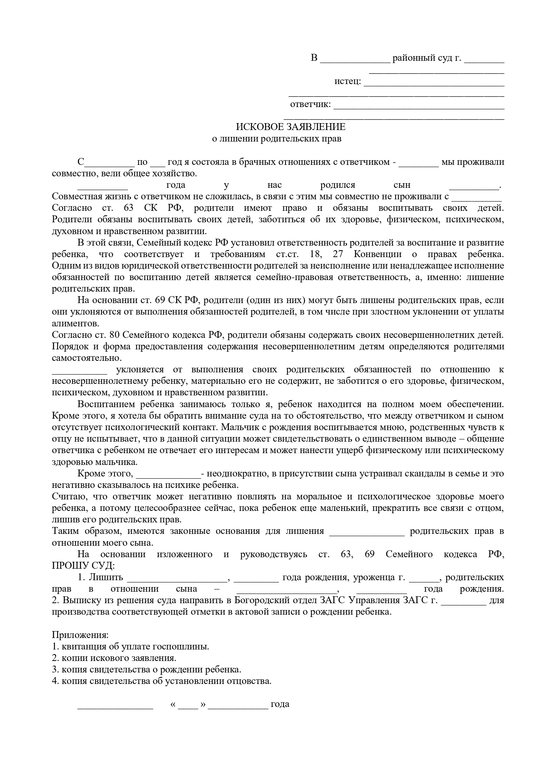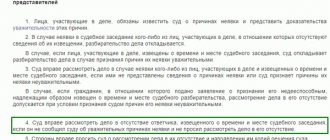Author of the article: Roman Gavrilov Last modified: January 2021 50199
Before you figure out how to deprive a former official spouse or common-law husband of paternity, you need to take into account that, in the legal sense, a man can cease to be a father if the child is adopted by another person. Deprivation of parental rights does not terminate paternity and the obligation to provide for the child: provide him with alimony, and bear the costs of additional actual expenses. Adoption of a child is possible with the consent of the father or without consent, if the man is deprived of parental rights and at least six months have passed after the completion of the procedure.
Expert commentary
Gorchakov Vladimir
Lawyer
In family law, deprivation of the right to raise a child by a parent is considered an exceptional measure. It is possible only in the cases specified in the RF IC - Art. 69. The procedure requires a trial and the mandatory participation of the prosecutor - his written legal position on the case. You will also need a preliminary and final (voiced in court) conclusion of the guardianship authorities, which the second parent or other interested legal representative of the minor has the right to apply to.
General information about deprivation of paternity
The father is vested with rights in relation to the child from the moment his data is entered into the children's documents. The list of parental rights is specified in the Family Code.
Basic rights of the father:
- for communication;
- for education;
- to participate in training;
- property rights (to receive pensions and benefits from the state, inheritance in the event of the death of a child, collection of alimony from an adult able-bodied son).
Expert opinion
Stanislav Evseev
Lawyer. Experience 12 years. Specialization: civil, family, inheritance law.
Deprivation of paternity is used as a last resort for parents of a minor child. If children have reached 18 years of age, no punishment can be applied.
Often, the application of a measure is preceded by a restriction of rights or long-term preventive work with the family by social services.
Only a court can deprive paternity. Before the court decision comes into force, the man has the right to demand the return of the child from any person who is illegally detaining him.
Important! It is impossible to initiate the process of depriving paternity if the man is in prison. The exception is taking into custody in the case of murder or harm to the health of the mother or another relative of the child.
What could be the reasons for depriving a father of parental rights?
In Art. 69 of the RF IC specifies the circumstances under which parents can be deprived of their rights, including the grounds and reasons for deprivation of paternity, for which a parent can forcibly lose his rights to a minor and which are associated with his malicious evasion of parental responsibilities. This legislative norm contains an exhaustive list of what can lead to deprivation of paternity, which includes:
- cruel treatment, physical and mental violence;
- refusal to pick up a child from a maternity hospital, hospital, or child care facility;
- abuse of father's rights (in the broad sense);
- non-payment of alimony;
- indifference to the child's life;
- immoral lifestyle (drug addiction, alcoholism);
- intentional crimes against the health of the spouse and/or children.
The legislator clearly regulates in which cases it is possible to initiate a procedure for forced deprivation of paternity on legally valid grounds.
Reasons for deprivation of paternity
A complete list of grounds for deprivation of paternity is provided by the Family Code:
- Refusal or evasion of financial support (non-payment of alimony for a long time without good reason).
- Cruelty to a minor. Abuse includes physical (beatings, torture, harm to health), psychological or sexual violence. The fact must be confirmed by a verdict of criminal prosecution.
- Abuse of paternal rights. Abuse includes being forced into vagrancy, alcohol or drug use, involvement in criminal activity, or solicitation for prostitution.
- Remaining in a medical or social organization. One option is to abandon the newborn in the maternity hospital. This is equivalent to being left in a social center, a children's department of a hospital, or a children's camp.
- Registered at a drug treatment clinic with a diagnosis of alcoholism or drug addiction. The presence of the disease must be confirmed by a specialist.
- Bringing to justice for committing a crime against the life or health of a child, his mother, mother’s husband or other relatives.
In practice, failure to meet the child's needs is equivalent to abuse. For example, if the father refuses to buy food, seasonal clothing, or bed linen. In this case, the plaintiff does not have a court verdict to hold the citizen accountable.
The presence of culpable actions is proven with the help of a court decision to limit paternity. If the man has not restored his rights within 6 months, then the child’s legal representative must initiate deprivation of rights.
List of required documents
Before the start of criminal proceedings, you need to draw up documents according to the established template and take them to the department of guardianship and trusteeship authorities. You will need:
- a photocopy of a document confirming the birth of the child;
- an extract received from the management company at the address where the child actually lives;
- a photocopy of a document confirming that the mother divorced her ex-husband;
- a copy of the child's financial account.
See also:
Divorce and pregnancy: how to dissolve a marriage under such delicate circumstances?
It is imperative to document why it is necessary to protect the child from the influence of the father. To do this, you can use papers stating that the father was prosecuted for administrative or criminal offenses. You can also provide certificates proving that there has been domestic violence, cases of abuse of psychotropic substances, narcotic substances or alcohol.
Before the trial, it is necessary to collect documentary evidence of the need to protect the child from the influence of the father.
All this can be considered as grounds for deprivation of paternity. If the child is already 10 years old, the authorized body can accept from him a document of consent to remove the father from upbringing. The template for this application is established by law.
A list of all documents that must be attached to the statement of claim can be found in Articles 131, 132 of the Civil Procedure Code of the Russian Federation. In order not to leaf through multi-page laws, samples of the necessary papers and the order in which they need to be filled out can be easily found on the Internet. It is important that all documents are drawn up according to the proper template and contain a list of exactly what claims are being made against the negligent father.
The procedure for depriving paternity without the consent of the father
Let's consider whether paternity can be deprived without the father's consent. The law provides for this possibility. If illegal actions are committed against a minor, the father's consent is not required.
The procedure takes place exclusively in court. The application is considered in the city or district court.
The initiators of the process can be:
- mother of the child;
- legal representative of the minor (guardian, foster parent or director of the orphanage);
- district prosecutor;
- district guardianship department;
- District Juvenile Affairs Commission.
If the application is submitted by other citizens or officials, the court will return the documents without consideration.
Step-by-step instruction
The procedure is almost identical regardless of the plaintiff. Algorithm of the applicant's actions:
- Preparing for the process.
- Collection of evidence.
- Preparing a claim.
- Going to court.
- Trial.
- Obtaining a court decision.
Preparation for the process
Let's look at where to start depriving paternity. Before going to court, measures must be taken to preserve the blood connection between father and child. Since punishment is applied exclusively in a situation where other measures have failed.
Actions to preserve the family are carried out if the procedure is initiated by social authorities or the prosecutor's office. The mother can submit documents without prior preparation.
However, to satisfy the requirements, it will be necessary to prepare a significant amount of evidence of the feasibility of the decision made.
If a man does not fulfill parental responsibilities for financial support, then he must obtain a certificate of the amount of alimony debt.
Additionally, you can contact the guardianship department at the father’s place of residence to conduct an examination of living conditions. Specialists will visit the living space and draw up a report. The document must reflect the lack of living conditions for the child, the lack of children's things, and the lack of a sleeping place for the child.
Important! The measure applies exclusively to the blood father, whose relationship is officially confirmed.
Collection of evidence
The following documents must be collected as evidence:
- civil passport of the initiator of the process;
- documents confirming the authority of the plaintiff (certificate of a guardian or adoptive parent, power of attorney from an organization for orphans);
- child's birth certificate;
- document on marriage/divorce;
- an extract from the house register about the child’s place of residence;
- characterizing materials about the father (from the place of work, study, from neighbors, from the district police officer).
A mandatory document is the basis for deprivation of rights. Among them:
- a verdict of causing serious harm to health or murder of a mother, child or other relative;
- verdict of child abuse (beatings, torture);
- conviction of sexual abuse of a child;
- resolution on the involvement of minors in drinking alcohol;
- court decision to limit paternity (6 months after the decision is made).
The exact list of documents depends on the specific situation.
Preparing a claim
The statement of claim for deprivation of paternity must contain the following information:
- name of the judicial authority;
- applicant details;
- information about the defendant;
- third parties (guardianship department);
- prosecutor's office;
- title of the statement of claim;
- information about the relationship between the child and the man;
- grounds for deprivation of rights;
- measures taken to preserve the family;
- reference to law;
- claims, including collection of alimony (if the funds were not collected earlier);
- list of documents;
- signature and date.
Sample statement of claim for unilateral deprivation of paternity without the consent of the father

Going to court
Let's consider where the applicant should apply. The documents are sent to the district court at the place of registration of the man. If the exact place of residence is unknown, then the documentation is sent to the last known place of residence.
If the applicant demands to collect alimony, the documents can be sent to the court at the place of registration of the child. To do this, you must attach an extract from the house register.
Documents can be sent to the court:
- personally;
- by mail;
- through a representative.
If the documentation is sent by mail, then you need to include a description of the contents in the envelope. Documents are prepared according to the number of parties to the process (defendant, court, prosecutor's office, guardianship department).
Trial
The applicant must attend the trial in person. During the process, you will need to confirm your claims.
The initiator of the proceedings must be prepared for a personal meeting with the defendant. The judge may ask clarifying questions.
If written evidence is insufficient, the applicant may bring witnesses to court. The following may serve in this capacity:
- child's teachers;
- neighbours;
- relatives;
- Friends;
- representatives of social authorities;
- district police officer
Depending on the specific situation, other citizens may be invited. They must confirm the father's inadequate performance of parental responsibilities and the danger of leaving the child with him.
Obtaining a court decision
If the claim for deprivation of paternity of the ex-husband is satisfied without his participation, it is necessary to obtain a court decision that has entered into force.
In addition, the court issues 2 writs of execution:
- about the removal of a child;
- on the collection of alimony.
If the child is with the man, according to the writ of execution, the bailiffs must seize him and hand him over to the person established by the court decision.
If the initiator of the process was the prosecutor's office or social authorities, then the minor is transferred to the care of the guardianship department. The subsequent relocation of the child is determined by the decision of the municipality.
Litigation for deprivation of paternity rights
Based on all the documents provided, the authorized bodies draw up a conclusion that describes the situation in detail and characterizes the conditions in which the child lives. This application, together with a package of documents compiled according to the sample and a statement of claim, is sent to the court. A sample statement of claim for deprivation of parental rights is established by Article 126 of the Civil Procedure Code of the Russian Federation.
After becoming familiar with the circumstances of the case, the court begins to consider the claim. If there are enough facts indicating that the father has violated his parental responsibilities, then the court may satisfy the claim and issue a decree for the forced deprivation of parental rights.

Sometimes the court gives the defendant time to correct his inappropriate behavior
The court has the right to reject the claim demanding the deprivation of the father's parental rights, but with a warning to the defendant that the case may be brought again in the future. In addition, sometimes the defendant is given time to correct his or her misconduct. In this case, it is not deprivation of paternity that is imposed, but the temporary removal of the parent from participation in upbringing. After a designated period after the official decision, but no later than 6 months, a rehearing takes place.
If you file a counterclaim drawn up according to the established template, you can challenge the court’s decision and regain the lost rights of the parent. After the father is deprived of parental rights, the mother is assigned the status of a single mother and can enjoy all the associated benefits.
See also:
Legal mechanism for recognizing paternity on a voluntary basis
Duration of the trial
The duration of the trial depends on the amount of evidence. If the applicant has provided the court with irrefutable information about the improper fulfillment of paternal rights, then the decision will be made in 1 meeting. In such a situation, from filing the application to receiving the court decision, it will take 2 months + 1 month to give the document legal force.
However, the period of proceedings may be extended if:
- the man brings witnesses who prove the absence of guilty actions on his part;
- there is no irrefutable evidence of guilt;
- the plaintiff's witnesses do not appear at the trial;
- the judge goes on vacation;
- the father files an appeal.
In practice, cases of deprivation of paternity rarely last more than 4 months.
Applicant's expenses
Since the process of depriving paternity is carried out to protect the rights of a minor, the Tax Code does not require the applicant to pay a state fee. Costs are borne by the defendant if the claims are satisfied.
Let's consider what the plaintiff needs to pay. The main cost to the applicant is the cost of a lawyer.
| No. | expenditures | Price |
| 1 | Legal consultation | From 3,000 rub. But you can get it for free on our website. Just leave a request in the feedback form. |
| 2 | Preparation of a statement of claim | From 3,000 rub. |
| 3 | Representation in court | From 5,000 rub. for 1 meeting |
Obligation to pay alimony
Deprivation of paternity implies the exclusion of parental rights. However, the child retains property rights to material support from the father.
Therefore, the man must pay alimony ordered by the court. If the funds were collected earlier, the obligation to pay remains.
Moreover, in the event of deprivation of rights for evading the payment of alimony, the plaintiff can bring the man to criminal liability. The maximum penalty for refusal to pay alimony is 1 year in prison.
Consequences for father and child
Consequences for the father:
- inability to communicate with the child;
- inability to live together with the child;
- abolition of all payments and benefits for families with children;
- impossibility of spending maternity capital if there is a certificate;
- a ban on issuing a certificate of maternal capital for subsequent children;
- abolition of benefits for large families;
- removal of the status of a large family;
- impossibility of collecting alimony from a child if he reaches the age of majority;
- impossibility of inheriting children's funds in the event of his death.
Consequences for the child:
- maintaining rights to alimony;
- preservation of inheritance rights;
- moving to a shelter, orphanage or to a guardian's family (in the absence of the mother);
- the opportunity to communicate with the father with the consent of the mother.
Consequences for the mother:
- in labor relations it is equivalent to a single mother (in case of dismissal, transfer to another job, layoff);
- has no rights to benefits and payments to a single mother.
Consequences for a minor
Article 69 of the RF IC lists cases in which it is possible to legally deprive a father of parental rights.
Let's look at them in more detail. A lack of concern for the health and development of children, failure to participate in education, and refusal to support a minor is regarded as evasion of paternal responsibilities.
Most often, this basis includes cases where the father maliciously evades fulfilling his alimony obligations. If the debt arose due to the fault of the parent and he was brought to administrative or criminal liability for this, then the court can deprive the man of parental rights.
Such actions of a parent that lead to negative consequences are regarded as abuse of rights in relation to children. A sample list includes:
- prohibition from studying at an educational institution;
- attraction to participation in gambling;
- incitement to vagrancy;
- forced to engage in begging, theft, prostitution;
- propaganda of drugs and alcohol;
- involvement in religious work of organizations that are prohibited by court decision.
Each case is considered individually and supported by evidence.
Abuse is physical and mental abuse of children. For example, a father causes harm to health, tortures, beats a minor, threatens and raises his voice at him. Violation of a child’s sexual integrity leads to especially dangerous consequences.
Often the cause of deprivation of paternity is chronic alcoholism and drug addiction. This fact must be confirmed by medical documents. It does not matter whether the father has limited legal capacity or not.

If a parent commits a deliberate crime against a minor, he may lose parental rights. Actions committed against life and health are taken into account:
- children;
- second parent;
- another family member.
The fact of the crime must be proven and confirmed by a court verdict that has entered into legal force.
It happens that a child has undergone treatment in a medical institution or his time in a sanatorium or boarding school has ended, but the parent refuses to pick up the minor. If, after warning the guardianship authorities and temporary restriction of parental rights, the father abandoned the child, he may be deprived of parental rights.
Let's consider what consequences arise when paternity is deprived for the father, child and mother.
The man finds himself in the most disadvantageous position. He loses the right to:
- communication with the child;
- cohabitation of minors;
- payment of benefits assigned to citizens with children;
- issuance of a certificate for maternity capital;
- benefits for children with many children;
- child support after reaching adulthood;
- inheritance of property of a minor.
The child retains the right to the child and inheritance of the father's property. With the consent of the mother, he has the right to communicate with the second parent. If a minor has only a father, he is placed in an orphanage, orphanage, or given to a guardian.
After a man loses his paternal rights, a woman has no grounds for assigning social benefits to single mothers. At the same time, in labor relations she has the same status as a single mother. She cannot be laid off or transferred to another job as a single mother.
To deprive a man of paternity without his consent, you need to carefully prepare. It will be difficult without the help of a professional lawyer. You can get an initial consultation on our website. Contact our lawyer now! The service is provided free of charge.
Either parent may be deprived of the right to raise a child
Any of the parents, in this case the father, is deprived of parental rights in the event of:
- neglect of parental responsibilities (lack of material support and meetings with the child);
- refusal, without good reason, to take your own child from the institution or organization where he is temporarily located (this could be a maternity hospital, school, kindergarten, etc.);
- use of parental rights to the detriment of a minor;
- abuse of a child, including physical and moral pressure on him;
- if a parent encroaches on the sexual integrity of a minor;
- if the father uses drugs or alcohol and has a chronic addiction.
A father who makes an attempt on the life and health of a child or his other parent is also deprived of parental rights. In addition, it is possible and necessary to insist on carrying out the procedure for depriving paternity if the father does not have a permanent place of residence - he is homeless or is a member of an organization prohibited on the territory of the Russian Federation, is engaged in illegal activities and is trying to involve the child in it.
Loss of paternity does not deprive a citizen of responsibilities to the child
The consequences of loss of rights to a child are set out in Art. 71 of the Family Code of the Russian Federation and boil down to the following:
- The father loses any material rights to the property belonging to the child (he cannot inherit it).
- Adult children are obliged to support elderly parents, but the biological father, who has renounced his functions, cannot count on alimony from the child.
- Along with the loss of paternity, a citizen loses the right to social benefits and benefits provided by the state to citizens with minor children.
In this case, only the rights in relation to the child disappear, but not the obligations. Thus, a citizen who has renounced paternity is obliged to support his child; no one can cancel alimony payments (Article 71 of the RF IC). In addition, children of deprived parents may well inherit them and live in the residential real estate they own.
The restriction of a parent's rights is not final or unchangeable. If the father wants to improve the situation - stops drinking, taking drugs, undergoes a rehabilitation course or gets a job, in a word, eliminates all the reasons that became the reason for depriving him of his status as a parent, there is always a chance to restore his own rights (Article 72 of the RF IC ).
To do this they go to court. The applicant will need to provide substantial evidence of their own correction. In addition, if the child is already 10 years old, he will definitely be invited to a court hearing in order to express his own opinion about the possibility of communicating with the biological father.
If the child insists that he does not want to communicate with his father, then there can be no talk of restoring his rights. But the parent always has a chance to re-file a claim containing a similar request; the main thing is to reach an understanding with the minor.
We suggest you read: Is it possible to tow a car without license plates? || Law on removed license plates in parking lots
If the court makes a positive decision, the citizen is obliged to contact the registry office to change information about the minor in the birth certificate and other documents. To do this, he draws up an application and attaches to it a copy of the court decision, documents for the child and a receipt for payment of the state fee. The procedure does not take much time; usually the request is satisfied on the day of application.
In the modern world, fathers, unfortunately, more often lose their rights in relation to their children
To deprive a foreign citizen of parental rights to a child, the court must know:
- where the foreigner is currently located (at least the approximate place of residence or the address where he previously lived);
- information about whether a foreigner has temporary or permanent registration in the Russian Federation.
The guardianship authority of a foreign state must take part in the case. This is necessary to confirm the legality of the decision made. In addition, the plaintiff will need to independently notify the defendant that a lawsuit has been filed against him. The court can also do this, but in this case the case will be considered for a very long time.
The easiest way is if a foreigner lives in Russia or has issued temporary registration. In this case, the case of loss of rights to a minor is considered by a Russian court on the same grounds as in relation to any Russian citizen.
The plaintiff must take into account that when moving abroad, the verdict rendered by a Russian court can be challenged in local courts. A high probability of this remains provided that the father was not present at the court hearing and did not know about the initiation of a case against him.
Naturally, if there are serious obstacles to maintaining the relationship between a parent and a minor, a foreign court will side with the Russian court. But red tape cannot be avoided. When divorcing a foreigner, the easiest way is to immediately settle all issues related to common children.
Having both parents ready to take care of the child’s material and psychological well-being is the dream of many modern children. Unfortunately, most often fathers neglect their responsibilities towards children. By refusing to communicate with children and allocate funds for their upbringing and development, a man must know that there is a risk of losing rights to them, one of the consequences of which is the lack of legal opportunity to receive financial support from the child in old age.
Noticed a mistake? Select it and press Ctrl Enter to let us know.
The concept of parental rights is not directly specified in the law. As a general rule, the responsibilities of the mother and father are considered to ensure the rights of minor children. Among them:
- family education;
- communication with parents and other relatives;
- protection of the rights and legitimate interests of children;
- taking into account the child’s opinion;
- creating conditions for obtaining secondary education;
- first and last name of the minor.
The procedure for the emergence of paternal rights and responsibilities in relation to a child differs from maternal ones. To do this, a citizen must personally contact the district registry office with an application. This can be done before birth, at the time of birth registration or after.
The procedure for entering information about a man into children's documents is called establishing paternity. From the moment the changes are made, the man is given rights and bears responsibility for the child.
The law provides for the possibility of officially establishing paternity voluntarily (through the district registry office) or in court.




